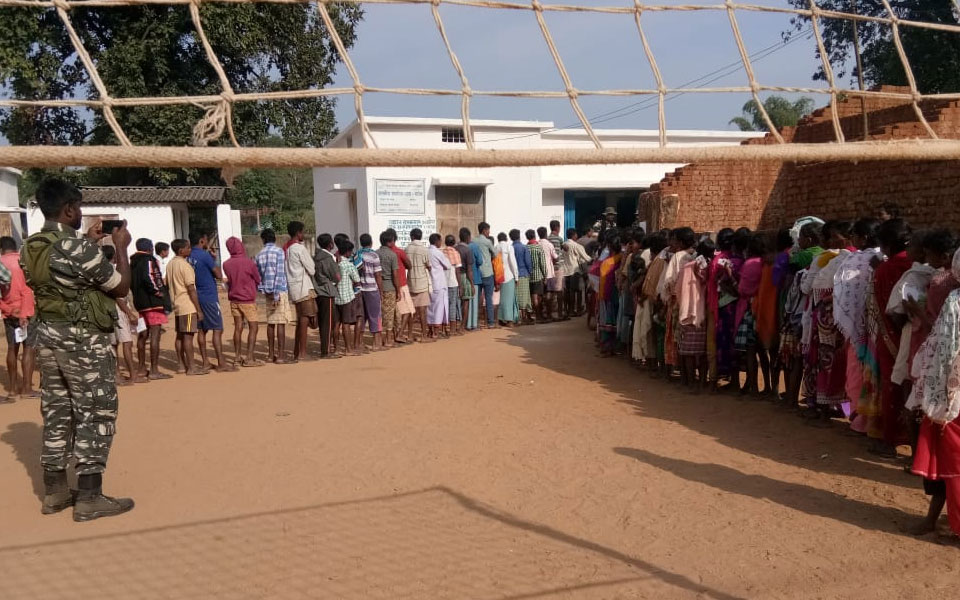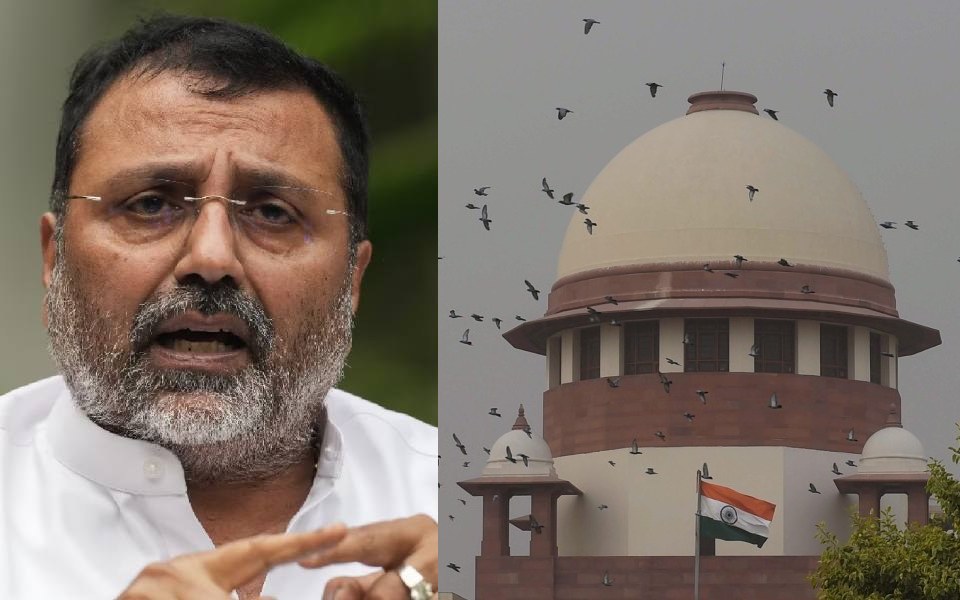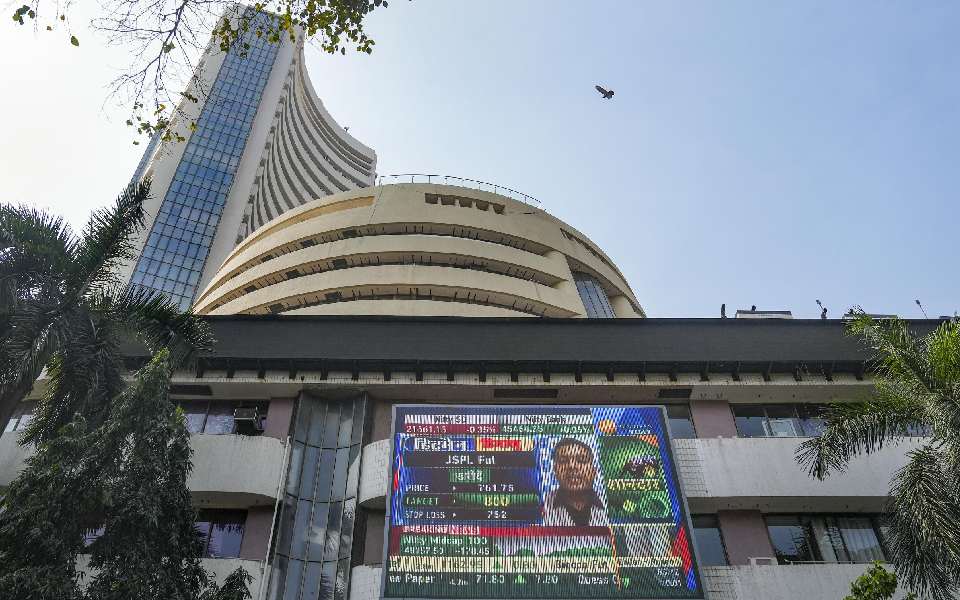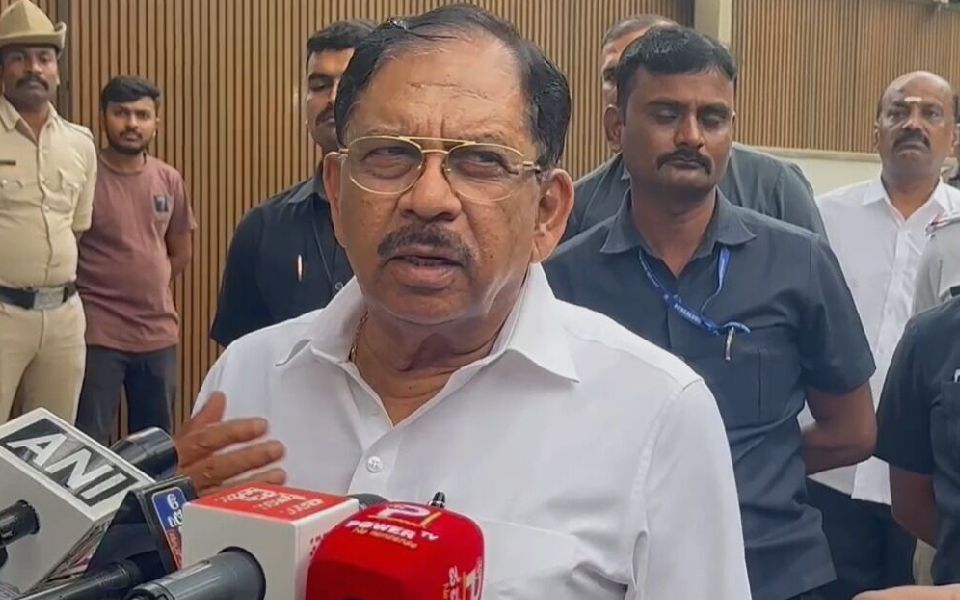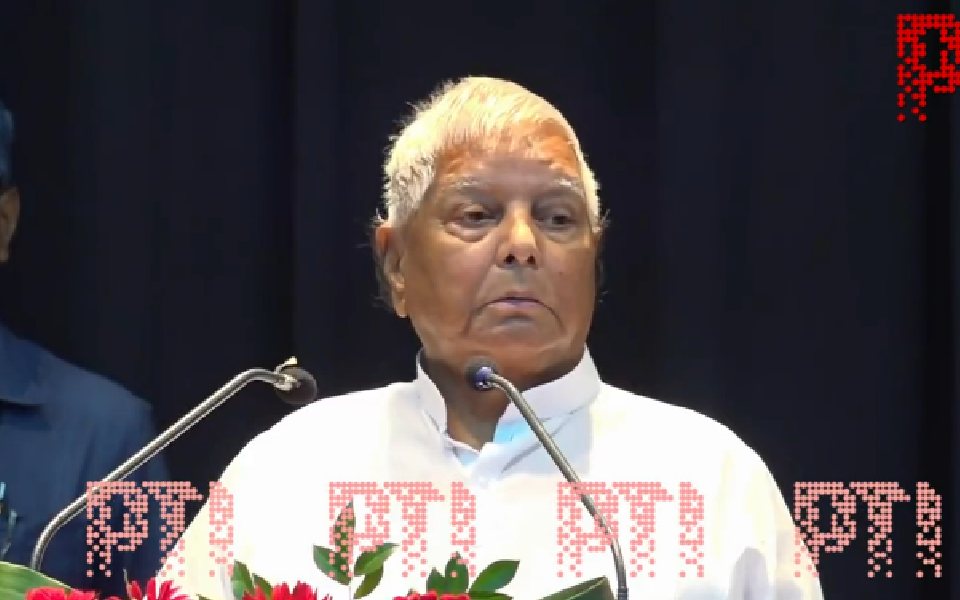Raipur, Nov 12 : Voting was underway in 18 Assembly constituencies in the first phase of the Chhattisgarh elections Monday during which an improvised explosive device (IED) was detonated by Naxals in Dantewada district.
A police official said Naxals, who had called for a boycott of the polls, detonated the IED early morning, but no casualty was reported.
A thick security blanket, comprising over 1.25 lakh police and paramilitary personnel, was thrown across the 18 constituencies as they fall under the Naxal-hit areas of Bastar, Kanker, Sukma, Bijapur, Dantewada, Narayanpur, Kondagaon and Rajnandgaon districts.
Polling in 10 constituencies -- Mohla-Manpur, Antagarh, Bhanupratappur, Kanker, Keshkal, Kondagaon, Narayanpur, Dantewada, Bijapur and Konta -- started at 7 am and would conclude at 3 pm, an election official said.
In the other eight constituencies -- Khairgarh, Dongargarh, Rajnandgaon, Dongargaon, Khujji, Bastar, Jagdalpur and Chitrakot -- voting began at 8 am and would end at 5 pm, he said.
An IED blast was triggered by Maoists early morning in Dantewada.
"The explosion took place around 5.30 am on Tumakpal-Nayanar road when a team of security men was escorting polling personnel to their booth," a senior police official said.
"No harm was caused to the security and polling personnel in the explosion. The polling party safely reached the Nayanar polling booth in Katekalyan area," he added.
Among the prominent candidates in the first phase were Chief Minister Raman Singh, ministers Kedar Kashyap (Narayanpur) and Mahesh Gagda (Bijpaur) and Bharatiya Janata Party's (BJP) Kanker Lok Sabha seat MP Vikram Usendi (Antagarh).
Nine sitting Congress MLAs -- Manoj Singh Mandavi (Bhanupratappur), Mohan Lal Markam (Kondagaon), Lakheshwar Baghel (Bastar), Deepak Kumar Baij (Chitrakot), Devati Karma (Dantewada), Kawasi Lakhma (Konta), Girwar Janghel (Khairagarh), Santram Netam (Keshkal) and Daleshwar Sahu (Dongargaon) -- were also in the fray.
Of the 18 seats going to polling in the first phase, 12 are reserved for Scheduled Tribes (STs) while one is for Scheduled Caste (SC) category.
The second phase of polling in 72 seats, out of the 90-member Assembly, would be held on November 20 and counting of votes would take place on December 11.
Let the Truth be known. If you read VB and like VB, please be a VB Supporter and Help us deliver the Truth to one and all.
New Delhi, May 8 (PTI): The Supreme Court has rapped BJP MP Nishikant Dubey for his remarks against it and Chief Justice of India Sanjiv Khanna, saying they tend to “scandalise” and lower the authority of apex court.
The top court, in a way, put an end to recent political debates as to who is supreme whether Parliament or the judiciary.
“It is the Constitution that is higher than all of us. It is the Constitution which imposes limits and restrictions on the powers vested in the three organs. The power of judicial review is conferred by the Constitution on the judiciary. Statutes are subject to judicial review to test their constitutionality as well as for judicial interpretation. Therefore, when the constitutional courts exercise their power of judicial review, they act within the framework of the Constitution,” a bench of CJI and Justice Sanjay Kumar said.
The top court, which spared the lawmaker from the contempt proceedings by dismissing a PIL, made scathing observations against Dubey for his remarks against it and the CJI following the hearings on a batch of petitions challenging the validity of 2025 Waqf law.
Dubey sparked a row when he said, “(the) Supreme Court is taking the country towards anarchy” and that “Chief Justice of India Sanjiv Khanna is responsible for the civil wars taking place in the country”.
“We have examined the contents of the assertions made by respondent 4 (Dubey), which no doubt tend to scandalise and lower the authority of the Supreme Court, if not interfere or tend to interfere with the judicial proceedings pending before this Court, and have the tendency to interfere and obstruct the administration of justice,” the CJI said in the order.
The bench further said, “We are of the firm opinion that courts are not as fragile as flowers to wither and wilt under such ludicrous statements.”
The comments were stated to be "highly irresponsible", reflecting a penchant to attract attention by casting aspersions on the Supreme Court of India and its judges.
The bench on May 5 heard a plea for contempt action against Dubey over his remarks and said they were the ones who heard the petitions against the amended Waqf law.
The court found a clear intent to impute motives to the bench by naming the CJI as responsible for "all the civil wars happening in India in order to incite religious wars in this country, it is only and only the Supreme Court that is responsible".
Judicial pronouncements result in a decision which may aggrieve a party or sometimes a section of the public, it clarified.
The top court, however, acknowledged critical analysis and objective criticism of an order's reasoning or even its outcome was protected under the fundamental right to free speech and expression under Article 19(1) of the Constitution.
The bench said Dubey's utterances showed his ignorance about the role of the constitutional courts and the duties and obligations bestowed on them under the Constitution.
“We do not believe that the confidence in and credibility of the courts in the eyes of the public can be shaken by such absurd statements, though it can be said without the shadow of doubt that there is a desire and deliberate attempt to do so,” it said.
Justifying its decision to dismiss the PIL filed by lawyer Vishal Tiwari against the lawmaker, the bench said, “judges are judicious”.
The bench went on, “Courts believe in values like free press, fair trial, judicial fearlessness and community confidence. Thus, courts need not protect their verdicts and decisions by taking recourse to the power of contempt. Surely, courts and judges have shoulders broad enough and an implicit trust that the people would perceive and recognise when criticism or critique is biased, scandalous and ill-intentioned."
Each branch of the state in a democracy, be it the legislature, executive or the judiciary, especially in a constitutional democracy, acts within the framework of the Constitution, it added.
“The judiciary, as an institution, is accountable to the people through various mechanisms....Judgments are put to scrutiny and critique. Decisions are debated and if required, corrected by exercise of right of appeal, review, in curative jurisdiction and by reference to a larger bench,” the top court said.
To deny the power of judicial review to the courts would be to rewrite and negate the Constitution, it added.
“While we are not entertaining the present writ petition, we make it clear that any attempt to spread communal hatred or indulge in hate speech must be dealt with an iron hand,” it noted.
The bench said hate speech couldn't be tolerated as it led to loss of dignity and self-worth of the targeted group members, contributed to disharmony among groups and eroded tolerance and open-mindedness -- must for a multi-cultural society committed to the idea of equality.
Any attempt to cause alienation and humiliation of the targeted group is a criminal offence and must be dealt with accordingly, it added.

